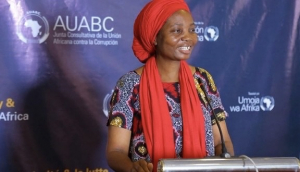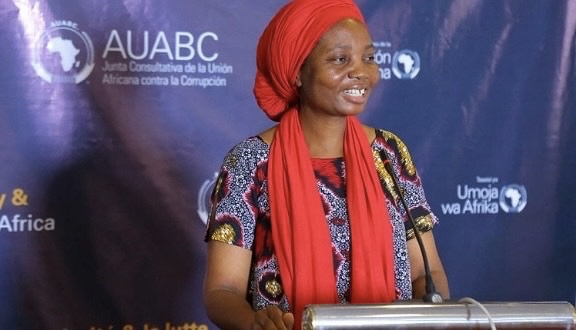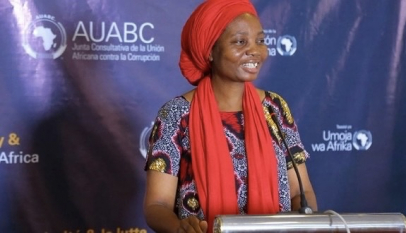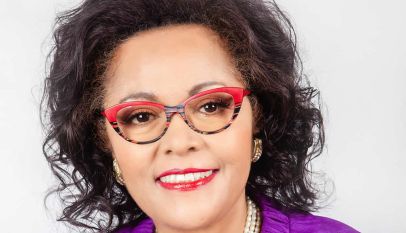EXCLUSIVE | How AU ABC is helping African countries fight corruption – Charity H. Nchimunya
Ms. Charity Nchimunya, Executive Secretary of the African Union Advisory Board Against Corruption (AUABC), speaks on the Board’s support to African countries to implement the provisions of the African Union Convention on Preventing and Combating Corruption (AUCPCC).

Newspage: The AU ABC was established to “promote and encourage the adoption of measures and actions by State Parties to prevent, detect, punish and eradicate corruption and related offences in Africa”. How has it been working to implement this crucial mandate?
Nchimunya: It has been a journey of success stories and also challenges; we engage a diverse range of stakeholders, state institutions and also civil society entities on corruption issues across state parties. In this regard, we carry out review missions in State Parties to the African Union Convention on Preventing and Combating Corruption (AUCPCC), through which we assess how far the State Parties have gone in implementing the various provisions of the Convention.
The review missions are crucial avenues through which we follow up on our crucial mandate and before we embark on such review missions, a State Party to the Convention has to send in their baseline report which serves as reference point on how they have been implementing the provisions of the Convention. Once we receive the baseline report, we analyze the major emerging issues before we go in-country for follow up on the issues.
We have been able to undertake several review missions across many State Parties and subsequently came up with recommendations which have been taken up by State Parties under the convention. For the AU Member States that are not yet State Parties to the Convention, we do carry out advocacy missions to their countries to lobby for the ratification of the Convention. The countries that are yet to ratify the convention are: Central African Republic (CAR), Cape Verde, Djibouti, Eritrea, Eswatini, Somalia, and South Sudan.
Very soon, we are embarking on an advocacy mission to the Kingdom of Eswatini to ascertain their peculiar challenges with the Convention and ensure they ratify and implement the provisions of the Convention. We are also in touch with Djibouti and may be visiting the country at a later date on a fact-finding mission. The idea is to have all the 55 Member States sign, ratify and implement the Convention. It is only by getting all AU Member States to implement the provisions of the conventions that we can make progress in the fight against graft in Africa.
Newspage: The year 2023 marks the 20th Anniversary of the AUCPCC, which was adopted by the Heads of State and Government in 2003 and came into force in 2006. How has it been monitoring progress in its implementation by the AU ABC?
Nchimunya: The progress in the implementation of the Convention has been mixed; there are countries that have really gone far in terms of the implementation of the provisions of the Convention, by setting up anti-corruption agencies and putting in place relevant legislations in relation to various articles of the Convention. So, relative progress has been recorded in the AUCPCC’s implementation.
However, there are others who seem to be lagging behind in the implementation of anti-corruption measures outlined in the Convention; the more review missions and other anti-corruption activities we are able to conduct as AU ABC, the more we will be able to help those that are lagging behind to learn positive lessons from those that are ahead. We want to see every country making progress so we can confidently say Africa is making headway in the fight against corruption.
Newspage: The last (2018 – 2022) Strategic Plan of the African Union Advisory Board Against Corruption (AUABC) was aimed at the realization of the Board’s short-term vision. To what extent were you able to implement it and what were your major constraints?
Nchimunya: I will say we recorded relatively significant progress with the implementation of the second strategic plan of the Board which covers the period 2018 – 2022, including achieving a number of key deliverables, particularly the ratification of the Convention by many Member States within the lifespan of the second strategic plan. This was due to a number of review missions implemented during the period.
We also succeeded in coming up with an annual flagship event which doubles as the statutory meeting of the Board known as the African Anti-Corruption Dialogue, which brings together Member States of the AU through their anti-corruption agencies to discuss pertinent issues on anti-corruption. We have a different theme for each year, focused on a particular aspect of the fight against corruption.
During this period, we commemorated 2018 as the African Anti-Corruption Year, which was a huge campaign and the first time the AU dedicated its yearly theme to anti-corruption. The campaign reaffirmed the commitment of African heads of states to the fight against corruption; the campaign was also a huge boost for us as a Board. President Muhammadu Buhari of Nigeria, served as the champion of the AU’s anti-corruption year, which attracted a lot of support for our work. Similarly, we did recommend to the AU the appointment of youth anti-corruption ambassadors from across the continent.
As we look forward to the 20th anniversary of the adoption of the Convention, we plan to make the anticorruption dialogue for 2023 the most dynamic dialogue we have ever held; we want to bring different stakeholders to brainstorm on how to scale up the fight against corruption on the continent. In terms of constraints, we have been grappling with a number of challenges, particularly the lack of financial and human resources, which are, however, being addressed through different channels.
Newspage: The ABC’s mandate is only advisory with the National Anti-Corruption Agencies (NACAs) being the frontliners in the fight against corruption in Africa. Don’t you think the advisory nature of your mandate inhibits you in the fight against graft, which is considered one of the major inhibitors of Africa’s development?
Nchimunya: Of course, our role is advisory in nature; as such, at the end of every country review mission, we come up with a report comprising our observations and recommendations, which we send to the AU Executive Council. The implication is that once the report’s recommendations are adopted by the Council, they become binding on the State Parties to the Convention to implement them. Afterwards, we do go back to the State Parties to find how far they have gone in implementing the recommendations. At the end of such missions, we again report back to the Executive Council to say State Parties A, B or C are still yet to implement certain recommendations.
Sure, we are an advisory body which supports the various National Anti-Corruption Agencies (NACAs) through our recommendations for implementation in their respective countries. However, we ensure that each and every State Party to the Convention is implementing the provisions of the Convention, since they are the ones with the legal mandate, which means we complement each other. Thus, I will say we are not constrained by our advisory nature, we offer our advisories to the State Parties who use them to enhance their investigations.
When we make recommendations to the Executive Council and they get adopted, State Parties do ensure they implement the recommendations to the extent possible. Nonetheless, there are times when a certain country’s national legislation or the setup of their institutions might not allow for the implementation of certain recommendations. Nevertheless, some countries have been able to undertake major reforms based on our recommendations.
Editor’s note: This interview has been edited for length and clarity











